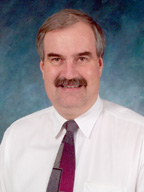Politics, said Prussian statesman Otto Von Bismarck, is the art of the possible.
That capability to facilitate change is one reason Paul Paulman, M.D., first became involved in the UNMC Faculty Senate, in 1997. This month, he became the senate’s president, a position that he’ll hold for one year.

“I’ve been interested in government activities for a while,” said Dr. Paulman, a professor in the department of family medicine. “I like to interact with groups and individuals to try to get something accomplished.”
As president of the 33-member Faculty Senate, Dr. Paulman will preside over the senate’s monthly meetings, represent the UNMC faculty at the Board of Regents meetings and serve as a communications liaison between the faculty and administrators, among other duties.
Dr. Paulman said that continuing the communication between administrators and faculty is a key goal, especially with uncertain economic times ahead.
“I’ll do the best job that I can to make sure that faculty have information,” Dr. Paulman said.
He also said that he wants to set some senate-wide goals; to promote development within the senate, in terms of the function and structure of its committees; and to promote leadership development within the senate.
Dr. Paulman credited the work of past president Lynne Farr, Ph.D., who encouraged him to accept the nomination for vice president/president-elect, and he said that he wants to make a smooth transition in June 2004 to Ellen Davis-Hall, Ph.D.
Personally, Dr. Paulman said, he thinks that faculty members at UNMC are duty-bound to balance their research activities with treating the underserved.
“We have a moral contract to serve the health needs of the state,” Dr. Paulman said. “In addition to research, we need to make sure that we continue to be available to help those who are less fortunate. We need to do both jobs well.”
|
|